 Audi is hoping to lure in more tech-driven buyers with a new in-car Wi-Fi data plan with T-Mobile that cuts the cost for using all those cool in-vehicle connectivity features in its tech suite. According to Audi, it’s a feature many prospective owners very much want.
Audi is hoping to lure in more tech-driven buyers with a new in-car Wi-Fi data plan with T-Mobile that cuts the cost for using all those cool in-vehicle connectivity features in its tech suite. According to Audi, it’s a feature many prospective owners very much want.
With the new data plan, Audi owners (and passengers) can have access to services like real-time news, weather and fuel prices and access to Google Earth over Wi-Fi through Audi connect infotainment and navigation system for $15 per month.
To get that deal, however, Audi owners will have to pay $450 upfront to cover a 30-month period, which comes to $15 a month for the in-car technology that allows drivers and passengers to access high-speed data on the go (where available).
Buyers can also opt to pay month-to-month for the service plan for a cost of $30 per month, which might beg the question: wouldn’t it be cheaper to just use the existing data plan on mobile phone or tablet, especially if the device could function as a hot spot?
Then again, we are talking about “Audi” – and when you consider the cachet associated with the premium brand, it does seem fitting that an Audi owner would be able to offer passengers the novel (for now) option of being able to log on to the car’ s Wi-Fi system.

When launched in 2011, Audi Connect was the first in-vehicle Wi-Fi connectivity service offered by a global auto manufacturer. The current system features a real-time view of their route with Google Earth and real-time Sirius XM traffic information. In addition to real-time data about localized weather, news and fuel prices; the Audi infotainment system also uses Google Voice Local Search to access detailed information about travel destinations such as restaurant or hotel hours, pricing and customer reviews.
With myAudi Destination, users can log on to Google Earth from virtually any location in the U.S. and download up to 50 destinations to the vehicle.
The company says Audi Connect allows for broadband connectivity for up to eight devices in the vehicle.


